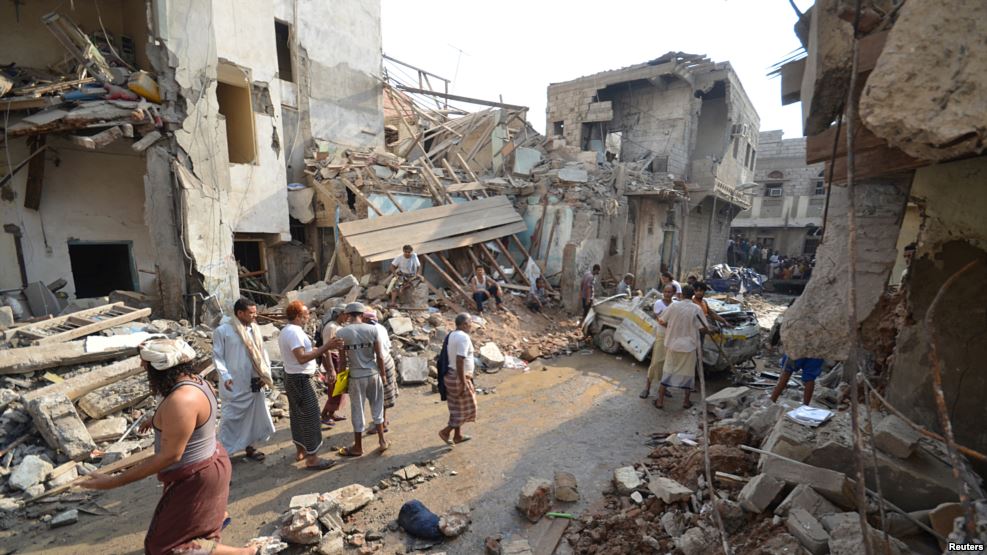PHOTO: Site of a Saudi-led air strike in the Red Sea port city of Hodeidah, Yemen on Thursday
Nick Cumming-Bruce reports for The New York Times:
United Nations human rights officials expressed alarm on Friday at a sharp rise in civilian casualties in Yemen since peace talks collapsed last month, the great majority of them inflicted in airstrikes by a coalition led by Saudi Arabia.
At least 329 civilians have been killed, and at least 426 have been injured since the beginning of August. Fighting resumed after Aug. 6, when talks collapsed between the Saudi-led coalition supporting Yemen’s president, Abdrabuh Mansour Hadi, and forces aligned with Houthi rebels supported by Iran who control the capital and large portions of the country.
The toll was reported as Saudi Arabia and Arab allies waged a diplomatic campaign at the United Nations Human Rights Council to stave off an international investigation into the conduct of hostilities and possible war crimes.
Heavy Saudi pressure on Western governments and businesses succeeded in stalling a similar initiative in the Council last year; diplomats say the Saudi Foreign Minister, Adel al-Jubeir, has again lobbied against an independent international inquiry. They add that growing awareness of the bloodshed has made it harder for the United States and Britain, Saudi Arabia’s major suppliers of arms and munitions, to look away.
An airstrike by the Saudi-led coalition on a market and residential area of the city of Hodeidah on Wednesday has been the most vivid example of the carnage. The United Nations Secretary General, Ban Ki-Moon, condemned the attack, which killed at least 26 civilians, according to human rights monitors.
“The death toll could be much higher,” Cécile Pouilly, a spokeswoman for the United Nations high commissioner for human rights, told reporters in Geneva on Friday. Ten days earlier, two coalition airstrikes had reportedly killed 21 civilians, including a group of men drilling for water.
The United Nations documented at least 41 attacks on civilian facilities like clinics, schools and markets by both coalition and rebel forces in August, killing at least 180 people, Ms. Pouilly said, a 40 percent increase on the casualties in July, when parties to the conflict were still in talks.
The charity Doctors Without Borders announced last month that it was pulling staff members out of six hospitals in Yemen after coalition planes bombed a facility, killing 19 people and injuring 24, the fourth time that hospitals supported by the group had come under attack by the coalition since the start of the war in March 2015.
By Thursday, the number of civilians killed this month had reached 149, she added, of which 126 were attributed to the coalition and nine to pro-Houthi groups, with others mostly killed by groups that were either linked to the Islamic State or had not been identified.
The United Nations also voiced concern over the effects of a blockade of the city of Taiz, enforced by popular committees aligned with the Houthi rebels, leaving residents critically short of food and water, Ms. Pouilly said, and causing a near-total collapse of health services.
The action added to a long list of Houthi abuses documented in a report to the Human Rights Council this month. The abuses include torture and extrajudicial killings; indiscriminate shelling and rocket attacks on residential areas; sniper attacks on civilians; the laying of land mines and arrests and intimidation of journalists.
The report also found, however, that the majority of civilian casualties had been caused by the Saudi-led coalition.
Saudi Arabia and President Hadi’s government condemned that report as biased and have put forward a resolution in the Human Rights Council calling on the United Nations to provide experts to work within a Yemeni commission investigating human rights violations. Rights groups are adamant that a national body lacks expertise and that its reporting falls far short of international standards.
The European Union countered on Friday by drafting a competing resolution calling for a United Nations mission to Yemen, setting the scene for a week of diplomatic haggling before the Council decides how to proceed.
“It’s a litmus test for the credibility of the council and its ability to engage with the needs of civilians on the ground,” said John Fisher, the Geneva director of Human Rights Watch. “We can’t leave it to a national process to deliver accountability.”
Mr. Hadi vowed at the United Nations on Friday to “extract Yemen from the claws of Iran,” and he accused Iran of taking a “multitude of actions and interventions” to block the path toward peace.

